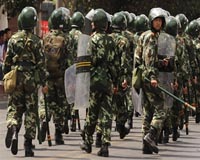 |
Beijing (AFP) July 11, 2009 Deadly unrest in China's Muslim-populated far northwest has highlighted deep tensions felt by dozens of ethnic groups across the vast nation that pose a growing problem for the government, analysts said. China's 55 minority groups make up nearly 10 percent of the population -- roughly 130 million people -- and many feel frustration at the economic dominance of the majority Han, as well as a loss of traditions and culture. "The clashes are of real concern to the leadership, particularly for their potential to spark further unrest among other minority groups with similar grievances to the Uighurs," said Sarah McDowall, political analyst for research group IHS Global Insight. In Urumqi, the capital of China's Xinjiang region, thousands of members of the mainly Muslim Uighur minority took to the streets on Sunday, triggering deadly unrest that the government said left at least 184 people dead. The violence in Xinjiang, home to over eight million Uighurs who have long chafed under Chinese rule, echoed deadly unrest in neighbouring Tibet last year when Buddhists angrily protested against alleged government repression. "The government really has serious problems," said Jiang Wenran, associate professor of political science at Canada's University of Alberta. "Beijing needs to squarely face the reality about how minorities are being treated by Hans, not only in Xinjiang, but in the rest of the country." The two most serious challenges to the government in terms of ethnic strife lie in the Himalayan region of Tibet and in Xinjiang, although tensions exist in other areas such as Inner Mongolia in the north, analysts said. A government policy of transferring members of the majority Han Chinese population to these distant areas to consolidate Beijing's authority has exacerbated resentment among the locals, they said. "The central government's strategy of population transfer to minority regions has fuelled suspicion that their real objective is in fact minority assimilation, under Han domination," said McDowall. In Xinjiang, for example, Han Chinese only made up five percent of the population in the 1940s, compared with more than 40 percent of the current population of around 20 million now. The Chinese government bristles at claims it is not respecting its ethnic minorities, and often points to the enormous amount of money it has spent in developing areas where they are based to raise living standards. Xinjiang's economy quadrupled to 400 billion yuan (60 billion dollars) in 2008 compared with how it stood in 1997, the state-run Xinhua news agency reported following the unrest, in one of many articles lauding government policies there. "But this has not produced the intended consequences of uplifting the local people as much as the Hans," said Jiang. There are a range of other preferential government policies for minorities, most strikingly in regards to China's famous one-child policy. While most Han Chinese are only allowed one child, people from minority groups are able to have more, depending on their circumstances. Ethnic minorities also have lower admission thresholds for universities, while the government gives extra poverty-alleviation funds to particularly poor minority areas. For some minorities -- such as the Dong, Miao and other hill tribes in mountainous southern China -- a top concern is the erosion of traditions as modernisation brings roads, tourists and environmental problems. But analysts point out this phenomenon is not unique to China. "All minorities that have a traditional way of life in China and elsewhere are threatened by modernisation and tourism, it's a universal problem," said Jean-Pierre Cabestan, professor of political science at Hong Kong Baptist University. Share This Article With Planet Earth
Related Links China News from SinoDaily.com
 China's leaders vow to punish Xinjiang rioters
China's leaders vow to punish Xinjiang riotersUrumqi, China (AFP) July 9, 2009 China's leaders vowed on Thursday to severely punish those responsible for bloodshed in the nation's far northwest that left at least 156 people dead and exposed deep ethnic tensions. The warning came as riot police and soldiers maintained a firm grip on Urumqi, the capital of Xinjiang region, where Muslim Uighurs and Han Chinese faced off this week in China's worst ethnic conflict for ... read more |
|
| The content herein, unless otherwise known to be public domain, are Copyright 1995-2009 - SpaceDaily. AFP and UPI Wire Stories are copyright Agence France-Presse and United Press International. ESA Portal Reports are copyright European Space Agency. All NASA sourced material is public domain. Additional copyrights may apply in whole or part to other bona fide parties. Advertising does not imply endorsement,agreement or approval of any opinions, statements or information provided by SpaceDaily on any Web page published or hosted by SpaceDaily. Privacy Statement |